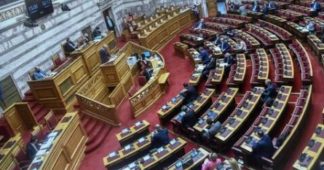Tasos Kokkinidis
Greece is heading to the polls on Sunday for an election that is highly unlikely to produce a government. An election re-run is expected to be held in early July with a different electoral law that could make the formation of a stable government more likely.
Opinion polls suggest that the governing conservative party of PM Kyriakos Mitsotakis is leading the race by around six percentage points over his main rival Alexis Tsipras leader of leftist SYRIZA.
But under the election’s proportional representation rules, no party is expected to win by a margin large enough to secure an outright majority in the 300-seat parliament.
If none of the parties can form a government after the May 21st election, Greece will have a second general election on July 2 using an enhanced proportional representation system that was voted on in 2020.
Under this system, the first party will receive a 20-seat bonus if it gets more than 25 percent of the vote. This bonus will increase with the party’s percentage of the vote, up to a maximum of 50 bonus seats for parties that get 40 percent.
Economy, rail disaster, wiretapping scandal
Mitsotakis, whose New Democracy party shows a drop in popularity following the deadly railway accident at Tempi on February 28, seeks to put behind him the anger sparked by the loss of 57 people. He is also trying to defend his handling of the wiretapping scandal that has rocked the political establishment since the summer of 2022.
He is campaigning on the back of four years of tax cuts, tourism revival and steady growth, and has warned denying his New Democracy party a strong mandate would lead to “paralysis” at a time of international uncertainty.
In an interview with Reuters on Tuesday, Mitsotakis expressed the hope that his next term would bring “years of rapid growth for Greece, but growth that will also limit inequalities.”
“I really want to put Greece on a different trajectory,” he underlined. He stressed that Greece in 2023 was in a much better place than it was in 2019, and said his plans were “to build upon that.”
Tsipras and his SYRIZA party promise to restore faith in a country shaken by a scandal over wiretapping by the security services and Greece’s worst-ever rail disaster that claimed 57 lives in February.
On Tuesday the leftist leader charged Mitsotakis with “bankrupting the country, plunging the economy into the quagmire and society into despair.”
In contrast, he noted, SYRIZA “lifted the country out of bankruptcy, freeing it from the memoranda and supervision by financial institutions.” It left 37 billion euros in state coffers, supporting Greek society “amidst a heavy storm.”
Tsipras vows to combat inflation which he blames on domestic “cartels”, increase public spending on education and boost wages for civil servants and health workers. “Greece has Bulgarian wages and British prices,” he said last week.
We remind our readers that publication of articles on our site does not mean that we agree with what is written. Our policy is to publish anything which we consider of interest, so as to assist our readers in forming their opinions. Sometimes we even publish articles with which we totally disagree, since we believe it is important for our readers to be informed on as wide a spectrum of views as possible.











